Americans' views shift on racial discrimination - CBS News poll
As thousands protest, their message is getting across. Comparing views at this moment to decades of CBS News polling, today we see more people — both white and black — saying racial discrimination affects both treatment by police and chances of getting ahead. And a declining number see progress in getting rid of it.
Where Americans had once shown increasing optimism about ending discrimination against blacks, those sentiments have turned downward lately, back toward levels we saw in the 1990s.
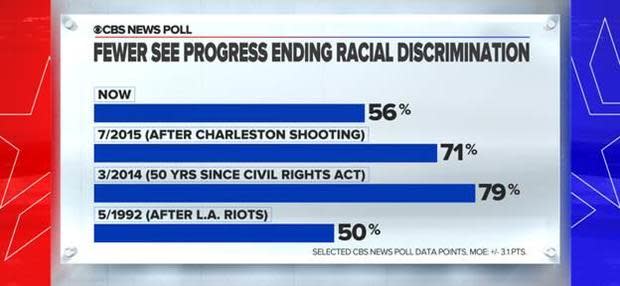
Over the years, this poll has asked Americans if there's been real progress against discrimination since the passage of landmark civil rights reforms in the 1960s. The view that yes, there has been, was generally — if slowly — on the upswing from the early 1990s through 2014. It declined some in July 2015 and has now dropped further.
Blacks are less likely now than in the past to say there has been real progress in ending discrimination. In 2015, when asked shortly after the shooting in Charleston, South Carolina, 56% said a lot of progress had been made. But today, that view has dropped to 38%, the most negative this sentiment has been since the 1990s.
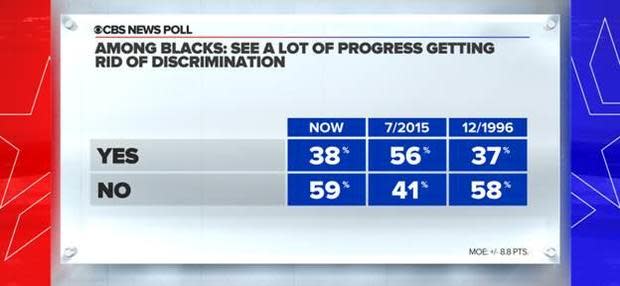
Eight in 10 Americans feel discrimination against African-Americans exists today, including half who say there is a lot of discrimination.
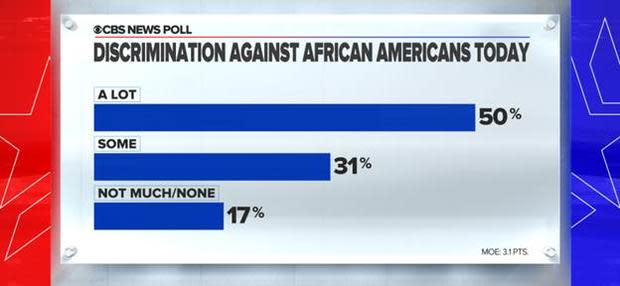
For years, many black Americans have steadily felt whites are at an advantage. But Americans overall have said that black and whites had equal chances of getting ahead in society. Today that's changed.
Now 52% believe whites have a better chance, up 13 points from 2015, and the highest number in CBS News polling going back to 1997. The number who still see both whites and blacks having an equal chance of getting ahead has dropped 9 points.
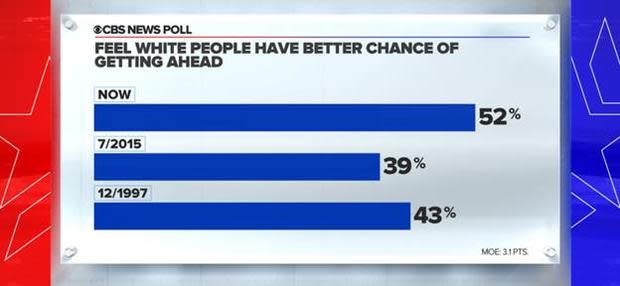
Half (50%) of whites think white people have a better chance of getting ahead, up from 35% five years ago.
Most white college graduates believe whites have a better chance of getting ahead than blacks, while a slim majority of those without a college degree think blacks and whites have an equal chance to get ahead.
Getting ahead
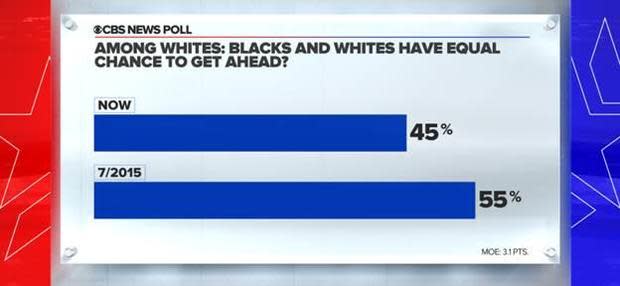
We've seen more movement among Democrats than Republicans. There's been an increase in the number of Democrats who think whites have a better chance of getting ahead and see more discrimination generally. Most Republicans continue to say whites and blacks have an equal chance to get ahead, as they did five years ago. Among whites, it is largely Democrats who now see whites as having an advantage in society, while most white Republicans continue to say both races have equal chances of getting ahead.
The state of race relations
Most Americans say race relations in the U.S. are bad, including majorities of both blacks and whites, and by more than two to one, more say relations are getting worse than better.
Views of the state of race relations are more negative than they were a year ago, and are similar to what they were in the spring of 2015 when there was unrest in Baltimore after Freddie Gray, a black man, died in police custody.
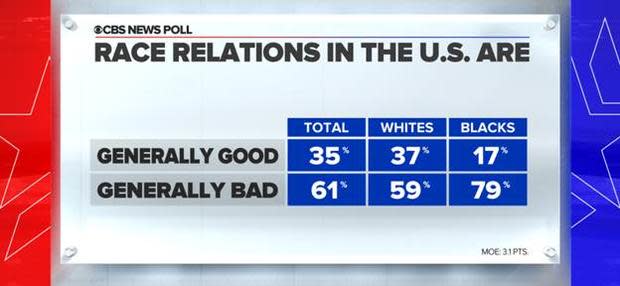
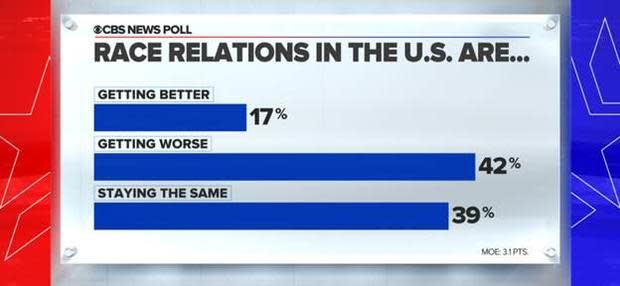
Republicans hold more positive views on the state of race relations.
Treatment by police
Meanwhile, more now feel there is racial discrimination by police. A majority — 57% — now think police are more likely to use deadly force against a black person than a white person, up from 43% in 2016. Here, too, much of this change comes from a shift in opinion among whites. More than half of whites (52%) now see racial discrimination against blacks in how police use force, compared to just a third (36%) four years ago.
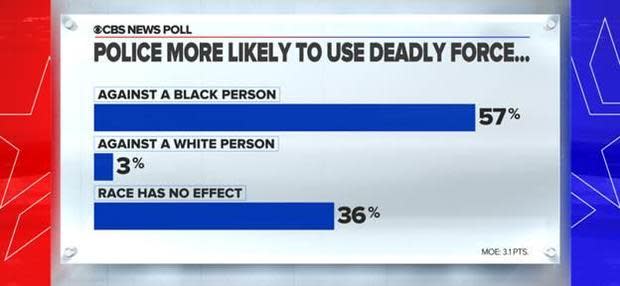
A large majority of blacks (83%) holds this view. And eight in 10 of those who feel there is a lot of discrimination against blacks feel police are more likely to use deadly force against blacks than whites.
There is universal agreement — across demographic groups and political ideology — that the force used by Minneapolis police in the detainment of George Floyd was not justified.
Like most Democrats and independents, a majority of Republicans do not think the force used by Minneapolis against George Floyd was justified.
Overall, when asked how police in their own community make them feel, black Americans are more likely than white Americans to say the police make them feel anxious.
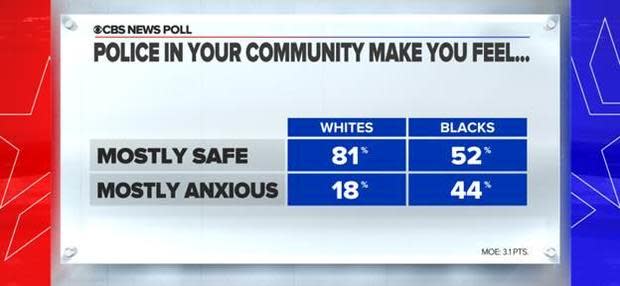
Direction of the country and the American Dream
Americans continue to show some doubt about the "American Dream," and black Americans are particularly skeptical. Just one in four Americans today describe the American Dream as "alive and well." Another four in 10 think it is "alive, but not what it used to be," while three in 10 say it is "dead or dying." These results are similar to what was recorded five years ago.
Blacks are more pessimistic than whites: nearly half of black Americans say the American Dream is dead or dying.
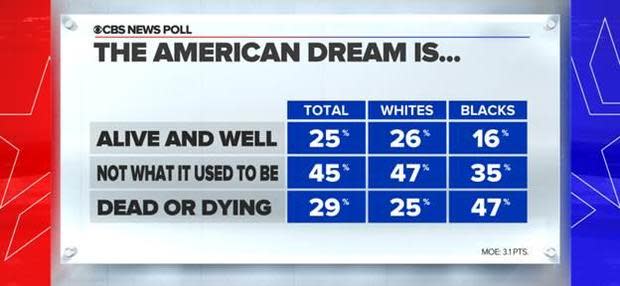
Furthermore, just one in 10 Americans who think there has been little progress in getting rid of racial discrimination feel the American Dream is alive and well, and nearly half say it is dead or dying.
Overall, 67% of Americans think the country is off on the wrong track, up 8 percentage points from a year ago. This is true of white Americans, and even more true of blacks.
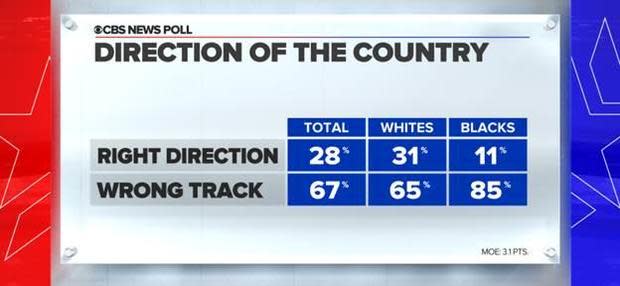
Americans tend to think their own opportunities to succeed have been better than those of their parents. This tends to be true of both white and black Americans.
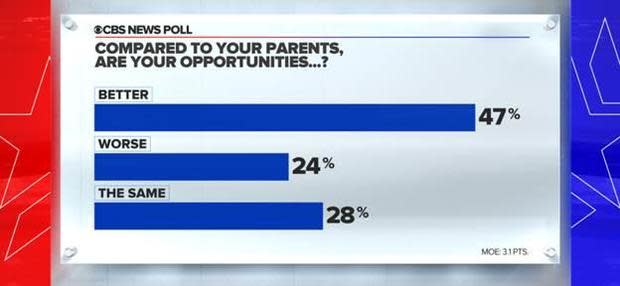
But there is more pessimism about the future. Forty-seven percent of Americans think the future of the next generation of Americans will be worse than life today, while just 28% think it will be better. Here again, black and white Americans feel similarly.
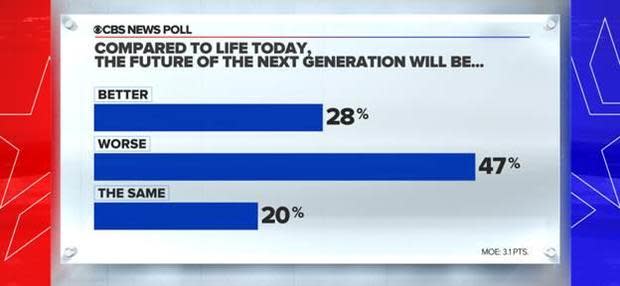
There are large partisan differences on all these long-term trend measures. Republicans tend to be more optimistic than Democrats or independents: 47% of Republicans think the American Dream is alive and well, (compared to 8% of Democrats and 24% of independents), and while six in 10 Republicans think their opportunities in life will be better than their parents' generation, just 40% of Democrats agree. But these percentages have shifted over time depending on which party holds the White House. During the Obama presidency, Democrats were more positive than Republicans on all of these measures.
The President and race relations
President Trump's overall approval rating stands at 40% and disapproval is 54% — both within the historically narrow range in which they vary; neither his lowest nor highest numbers. As always, given high marks from Republicans and faring worse among others.
Even fewer approve of his handling of race relations specifically, at 33%. Here again, his own party bolsters the numbers, with 72% of Republicans approving.
African-Americans overwhelmingly disapprove of the president's overall job performance and his handling of race relations.
The public has similarly negative views on the president's response to the situation in Minneapolis: 31% are satisfied with it, while 55% dissatisfied with it.
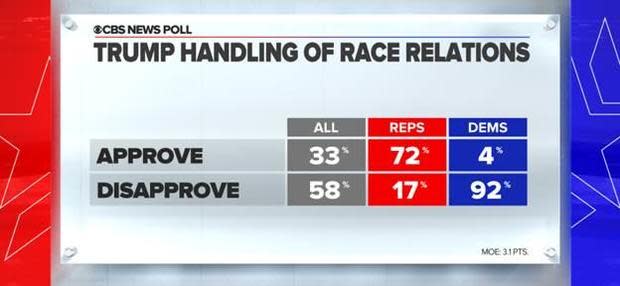
This poll was conducted by telephone May 29 - June 2, 2020 among a random sample of 1,309 adults nationwide. Data collection was conducted on behalf of CBS News by SSRS of Glen Mills, Pennsylvania. Phone numbers were dialed from samples of both standard land-line and cellphones.
The poll employed a random digit dial methodology. For the landline sample, a respondent was randomly selected from all adults in the household. For the cell sample, interviews were conducted with the person who answered the phone.
Interviews were conducted in English and Spanish using live interviewers. The data have been weighted to reflect U.S. Census figures on demographic variables.
The error due to sampling for results based on the entire sample could be plus or minus 3.1 percentage points. The error for subgroups may be higher and is available by request. The margin of error includes the effects of standard weighting procedures which enlarge sampling error slightly. This poll release conforms to the Standards of Disclosure of the National Council on Public Polls.
1.9 million more Americans apply for unemployment benefits
3 charged in Ahmaud Arbery's death appear in court via video
Fauci "cautiously optimistic" about progress on coronavirus vaccine
